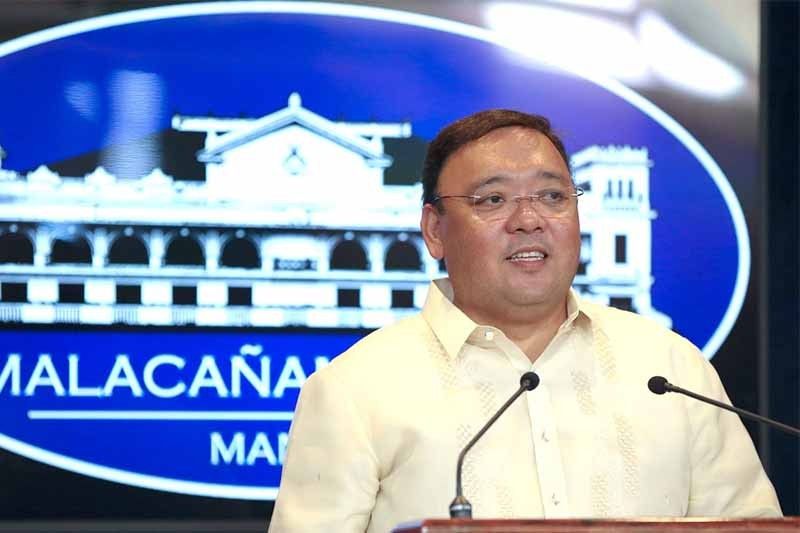UN rights chief's comment last straw for Duterte, says Roque
March 15, 2018 | 7:45pm

Presidential Spokesperson Harry Roque announced during a press briefing in Malacañang on March 12, 2018 that the Department of Agrarian Reform has distributed certificates of land ownership to 47 beneficiaries in the province of Rizal. Toto Lozano/Presidential Photo , file
MANILA, Philippines — Presidential spokesperson Harry Roque said the United Nations human rights chief's comment that President Rodrigo Duterte might need psychiatric evaluation was what convinced the president that there is a coordinated effort to shame him.
Duterte on Wednesday announced the stunning decision to withdraw Philippine ratification of the international treaty creating the International Criminal Court — a withdrawal that has yet to be done formally and will take a year from then to take effect.
When asked what made the president change his mind from being willing to face the International Criminal Court to deciding to withdraw, Roque said: "Asking him to see a psychiatrist. With the statement, the president is convinced that there must be some kind of a conspiracy on the part of pressure groups and UN officials to shame him."
The president has himself not been shy about using rants and curses against others, including critics and Barack Obama while he was US president.
Philippine government officials condemned UN Human Rights High Commissioner Zeid Ra’ad Al Hussein for his comments, which they said should not have been directed at a leader of a member-state.
This led the suddenly-sensitive Philippine leader, who blasted his critics in the past, often in crass language, to conclude there were some members of the international community and UN officials are biased against him and want to paint him as a rights violator.
What is complementarity?
Another reason Roque cited for the decision was the initiation of a preliminary examination by ICC prosecutor Fatou Bensouda, which the former human rights lawyer said violated the principle of complementarity.
Roque, one of those who heavily campaigned for the ratification of the Rome Statute, defended the president and blamed Bensouda for the president's decision to leave the international agreement.
However, a little more than a month ago, Roque described this same preliminary examination as a “welcome” opportunity to clear the Philippine leader's name.
"Now the decision to withdraw is because the ICC prosecutor violated the very basis by which the Philippines and 124 other countries gave their consent to become members of the ICC – this is the principle of complementarity," Roque said Thursday at the presidential palace.
Under the principle, the ICC is supposed to complement a state-party's courts.
"[F]irst and foremost, the courts at the national level should deal with cases of serious crimes. The ICC only deals with cases under very limited circumstances," it says in "Handbook on Complementarity:An Introduction to the Role of National Courts and the ICC in Prosecuting International Crimes."
Bensouda announced the opening of the preliminary examination. According to the handbook, "[i]n this process the [Office of the Prosecutor] looks at the information it has received or obtained and decides whether or not to open an investigation."
Other than announcing the preliminary examination, Bensouda has not made any comments on the matter.
'Only if local courts are not functioning'
The president's spokesman, an international law expert, said that the International Criminal Court was created as a tribunal of last resort, which would be activated only if local courts were unwilling or unable to function.
He stressed that Philippine courts are functioning and had even jailed two past presidents, referring to Joseph Estrada and Gloria Macapagal-Arroyo who are now Manila mayor and Pampanga representative, respectively.
He said that it should be the local courts which should investigate and try the president, who stressed in the past that the International Criminal Court would not have jurisdiction over him.
Presidents of the Philippines are immune from suit during their term.
Palace welcomed preliminary examination in February
In a press conference on Feb. 9, 2018, Roque said that the president welcomed the preliminary examination as an opportunity to clear his name from accusations of culpability in the mounting drug war killings in the country.
"While the position of the president is that, he welcomes this as an opportunity to clear his name from the accusation that he’s guilty of extra-legal killings, the president will also insist on the basis of our consent to become a member of the International Criminal Court and that is the principle of complementarily," Roque said then.
Roque also said that there was no indictment yet at the stage of preliminary examination, in which the prosecutor would just assess if there was reasonable basis to begin a preliminary investigation, which would involve investigation of specific individuals and instances.
Roque also vaunted then that the administration did not put much importance on the complaint and was confidence that it would not go beyond preliminary examination.
Bensouda: Examination not an investigation
Bensouda also stressed that the preliminary examination she was launching was not an investigation but a process of examining available information to reach a "fully informed determination" on whether there was basis to proceed to a formal probe.
Roque himself admitted in the press conference on Thursday that the aim of preliminary case was to see if the International Criminal Court had jurisdiction over the case.
"That may be the case, wrong political move, Madame Prosecutor," Roque said to Bensouda, a Gambian who has been legal Adviser and trial attorney at the International Criminal Tribunal for Rwanda and Justice minister of The Gambia.
BrandSpace Articles
<
>
Philstar
- Latest
- Trending
Trending
Latest






























